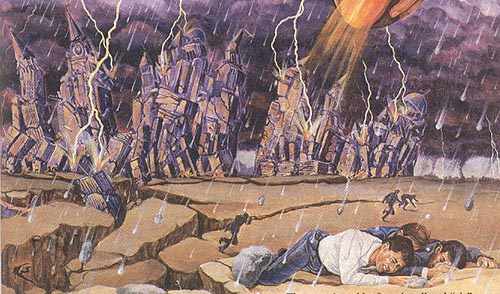
When I was a Jehovah’s Witness, I didn’t like to talk about Armageddon.
Don’t get me wrong, I loved to talk about the paradise. Who wouldn’t? I’d cheerfully tell anyone who asked, be they householder, interested person at the meetings, or curious workmate, about the awesome future that awaited. I’d talk about a world free from war, free from crime, full of incredible adventures that a peaceful, united human race would enjoy forever.
But when people asked how God would achieve this, I found myself getting a little vague and fuzzy about the details.
I mean, how do you say: “Well, first God needs to kill you and everyone you love, unless of course you fancy converting?” without making yourself look like a bit of a extremist loon?
I remember sitting in District Conventions, when the speaker would be holding forth with sound and fury on the subject of how God’s wrath would soon consume all those who failed to serve him. I would glance guiltily across at any “worldly” people who happened to be in the stadium, like the security guys, or the people working the concession stands. I’d feel like walking over to them and saying; “Don’t worry, he’s not talking about you, or your family or friends,” but I couldn’t, because he was.
I knew very well that unless they became Jehovah’s Witnesses, they were dead men and women walking.
Armageddon: An act of justice?
Let’s take a second to actually analyse the Watchtower’s teachings on Armageddon. It is presented by Watchtower as the war that Jehovah God will soon use to remove all of the Earth’s governments, and most of the Earth’s population, and install his own brand of rulership on the planet. He will fight it with his spiritual armies of angels, with his son Jesus leading the charge. He will have no need of human help, so Jehovah’s Witnesses will not be involved in any actual combat. Their role will simply be to stand and watch.
Who will survive? Well it depends who you ask. Or more correctly, it depends on who you are when you ask.
If you are a member of the public asking this question, you’ll probably get the answer: “That’s for God to decide. Only Jehovah can read a person’s heart. We don’t know who will survive and who won’t.” Take for example the FAQ on this subject from Watchtower’s official website JW. org. (Bold is mine.)
Many millions who lived in centuries past and who weren’t Jehovah’s Witnesses will have an opportunity for salvation. The Bible explains that in God’s promised new world, “
there is going to be a resurrection of both the righteous and the unrighteous.” (Acts 24:15) Additionally, many now living may yet begin to serve God, and they too will gain salvation. In any case, it’s not our job to judge who will or won’t be saved. That assignment rests squarely in Jesus’ hands.
Well, that sounds okay on the surface. Maybe I can just live a good life, treat my neighbour well, and Jesus will read my heart, see that I’m basically a loving, kind man and I’ll be spared?
No. Because this isn’t the answer Watchtower gives behind the scenes to an indoctrinated Jehovah’s Witness. Here are some examples of what Watchtower has said about Armageddon in other publications, with even more examples available at jwfacts.com (Bold has been added)
“Only Jehovah’s Witnesses, those of the anointed remnant and the “great crowd,” as a united organization under the protection of the Supreme Organizer, have any Scriptural hope of surviving the impending end of this doomed system dominated by Satan the Devil.” Watchtower 1989 Sep 1 p.19
“During the final period of the ancient world that perished in the Flood, Noah was a faithful preacher of righteousness. (2 Peter 2:5) In these last days of the present system of things, Jehovah’s people are making known Gods righteous standards and are declaring good news about the possibility of surviving into the new world. (2 Peter 3:9-13) Just as Noah and his God-fearing family were preserved in the ark, survival of individuals today depends on their faith and their loyal association with the earthly part of Jehovah’s universal organization.” Watchtower 2006 May 15 p.22 “Are You Prepared for Survival?”
“Similarly, Jehovah is using only one organization today to accomplish his will. To receive everlasting life in the earthly Paradise we must identify that organization and serve God as part of it.” Watchtower 1983 Feb 15 p.12
So it’s pretty definitive. While Watchtower tries to spin the doctrine to the general public that “all sorts of people might in theory survive Armageddon” the actual message in-house is that unless you are a practicing Jehovah’s Witness, you are toast.
Contemplate that for a while. Watchtower’s doctrine is that everyone who is not a Jehovah’s Witness will be killed, no matter how loving, how kind, how selfless they are in other areas of their life. They could have spent their life in Medicine Sans Frontiers, selflessly dedicating themselves to providing medical care to fellow human beings in some of the worst places on Earth, whereas a Jehovah’s Witness may have simply worked as an IT engineer in a comfortable office, and never really helped anyone much.
But come Armageddon, it would be the Jehovah’s Witness who would survive, and the selfless medic who would die screaming.
To summarise, the non-Witness population of the planet would undergo a systematic slaughter of every single man woman and child. There is a name for the systematic killing of a civilian population solely for the purpose of extermination.
Genocide.
The ethics of genocide
You don’t have to use your imagination to see what Armageddon would look like. Human history is replete with examples of genocide. To glimpse the future that a “loving” God will being, look to the concentration camps of World War II. Look to the mass graves and “ethnic cleansing” in the Balkans, or the hacking to death of vast scores of Tutsi and moderate Hutu by the Hutu majority in Rwanda.
Or look on the news reports right now at the work of ISIS in the Middle East, who are currently engaged in the wholesale slaughter of the Yazidi people.
Now, it goes without saying that 99% of Jehovah’s Witness are no doubt just as horrified as everyone else when they see the awful genocide that the so-called Islamic State are currently committing against the Yazidi population. The wholesale slaughter of men women and children, often in gruesome and sadistic ways, is an appalling crime that has brought universal condemnation from the international community and revulsion from anyone with even a halfway decent moral code.
Yet these men, women and children being slaughtered at the hands of ISIS, are the very same men, women and children who would be slaughtered at the hands of Jehovah if he brought Armageddon today, a slaughter the Jehovah’s Witnesses would be obligated to support and celebrate as a righteous act.
And it’s not like the slaughter would be any more humane; Watchtower does not teach that Jehovah will painlessly disintegrate his victims or cause them to simply fall asleep in quick, merciful death as would arguably be within his power to enact. No, Watchtower portrays this event as a violent holocaust, with people being crushed, burned and mutilated in a manner of which the sadists of ISIS would surely approve.
To prove this point, let’s take a look at some Watchower artwork depicting the event.
This is just a small sample of art produced by Watchtower to demonstrate what they believe Armageddon will look like. A whirlwind of terror and grisly violent death unleashed against a powerless and unsuspecting civilian population.
If you’re still in any doubt, listen to Governing Body Member Tony Morris, one of Watchtower’s seven leading men, hold forth on how those God kills will burn and split open like hotdogs.
Even worse, according to Watchtower theology, those who die before Armageddon will almost certainly be resurrected into God’s New World in order to have a second chance, whereas those who die at his hands at Armageddon are eternally destroyed. Remember that Watchtower FAQ quoted earlier in the article?
Many millions who lived in centuries past and who weren’t Jehovah’s Witnesses will have an opportunity for salvation. The Bible explains that in God’s promised new world, “
there is going to be a resurrection of both the righteous and the unrighteous.”
Why do I say “even worse?” Because this teaching creates an horrific moral loophole. If Witnesses take their theology to its logical conclusion, they should be celebrating the deaths of “worldly” people at the hands of killers like ISIS, for those “worldly” people at least have a chance of resurrection in the new world, whereas if they escape the ISIS sadists but then die at Armageddon, they are doomed forever.
Again, to stress, 99% of Witnesses would be horrified if one of their number suggested this.
An elder who gave a talk from a Kingdom Hall platform stating that Christians should rejoice in the death of worldly people, and that groups like ISIS were doing the people they killed a favour by sending them en-mass to Paradise via the loophole of pre-armageddon death, would appall his audience, probably have his microphone muted, be hauled off the platform and into a back-room, be given a savage dressing down by the rest of the elders, and would probably not allowed to give another talk for a very long time.
Yet this theoretical Elder’s logic, whilst horrifying and unacceptable to most Witnesses, is a correct reading of the logical end consequence of Watchtower doctrine.
Genocide is always genocide
The more I came to realise what the Armageddon doctrine actually entailed, the more I came to fear there might be something horribly wrong with the Organisation I was supporting and the doctrine it promoted. Were such a violent act to be committed by a human organisation or movement, I would be revolted, and condemn it for the vile act of barbarism it was.
So how did it suddenly become acceptable if the very same people were slaughtered by a deity who claimed to be the very essence of love? Billions of defenceless men, women and children, all killed horribly because they were not convinced that a slightly obscure and insignificant religion that occasionally knocked on their door, or stood silently next to carts full of wafer-thin magazines, was actually the One True Faith?
Like many before me, I increasingly found my conscience could not support the teachings Watchtower promoted.
Like many before me, I came to properly research my beliefs, and thus realised that the teachings Watchtower promoted were often not even in harmony with the Bible.
And in time, like many before me, I left the Watchtower religion. In a way, Armageddon set me free.
Just not quite in the way Watchtower had intended.










Earlier Scag made mention of Matt. 24:21 about the great tribulation. An interesting verse. It simply says a great tribulation such as has not occurred since the world’s beginning nor will occur again. It is a notable occurrence, a great tribulation. But no where does the Bible say it was the greatest or the worst. It was simply note worthy and again Jesus was specific about which generation would be alive to see it. Regards
The tribulation of the year 70 was how?
Hi Baby,
I don’t know if you are a JW but you can research their literature to get some idea. However the “Works of Josephus” offers a very graphic and compelling account of what happened between 66-70 when the Roman armies entrapped people within the city, killed those attempting to escape, withheld food to enforce a famine so great women ate their own children. Even the Roman officers were repulsed when they were searching homes and smelled cooking only to enter the home and find that a woman had roasted her baby. What kind of tribulation would it take to cause someone to eat their child? It was a great and ravishing tribulation indeed that came upon Jerusalem.
Regards
I notice the comment comes up frequently “how do we know God exists”? The answer is of course there is a written record. But some will say there is none of the original notes by the writers. If this argument continues then what happens to ALL written records no matter who has written them if the writer and their contemporaries are dead? If you do this then you throw all written records into the cesspool of doubt. One should take things on good faith, until otherwise known. Two simple examples, is there any manuscripts personally written by Josephus in existence? I don’t think so. Legitimately how can you refer to him since their is no living proof of his existence? Second example, Shakespeare. There are some people who don’t believe Shakespeare existed. Others do. But someone wrote those works in that name. The adroit people examine the works to see whether the works exhibit wisdom and are worth reading. I think Shakespeare’s and Flavius Josephus’s written works are worth reading as I do God’s written works. The WTS and its written works are getting shaky these days, but all is in the reader with a mind of discernment.
I tend to believe in God, but not because someone wrote it down. Regarding ur statement, “One should take things on good faith, unless otherwise known.” Seriously? I would think that’s more of a recipe for disaster. It’s certainly 1 of the biggest problems with Jehovah’s Witnesses.
How about trust but verify?
WS
@enuttenuff
It’s about finding corroborating sources. If just one ancient source says something happened it’s questionable. If two or three say it, it becomes likely. If multiple sources agree, then in most cases it can be considered fact.
WS
Are the Biblical Documents Reliable?
Jimmy Williams
Introduction
How do we know that the Bible we have today is even close to the original? Haven’t copiers down through the centuries inserted and deleted and embellished the documents so that the original message of the Bible has been obscured? These questions are frequently asked to discredit the sources of information from which the Christian faith has come to us.
Three Errors To Avoid
Do not assume inspiration or infallibility of the documents, with the intent of attempting to prove the inspiration or infallibility of the documents. Do not say the bible is inspired or infallible simply because it claims to be. This is circular reasoning.
When considering the original documents, forget about the present form of your Bible and regard them as the collection of ancient source documents that they are.
Do not start with modern “authorities” and then move to the documents to see if the authorities were right. Begin with the documents themselves.
Procedure for Testing a Document’s Validity
In his book, Introduction in Research in English Literary History, C. Sanders sets forth three tests of reliability employed in general historiography and literary criticism.{1} These tests are:
Bibliographical (i.e., the textual tradition from the original document to the copies and manuscripts of that document we possess today)
Internal evidence (what the document claims for itself)
External evidence (how the document squares or aligns itself with facts, dates, persons from its own contemporary world).
It might be noteworthy to mention that Sanders is a professor of military history, not a theologian. He uses these three tests of reliability in his own study of historical military events.
We will look now at the bibliographical, or textual evidence for the Bible’s reliability.
The Old Testament
For both Old and New Testaments, the crucial question is: “Not having any original copies or scraps of the Bible, can we reconstruct them well enough from the oldest manuscript evidence we do have so they give us a true, undistorted view of actual people, places and events?”
The Scribe
The scribe was considered a professional person in antiquity. No printing presses existed, so people were trained to copy documents. The task was usually undertaken by a devout Jew. The Scribes believed they were dealing with the very Word of God and were therefore extremely careful in copying. They did not just hastily write things down. The earliest complete copy of the Hebrew Old Testament dates from c. 900 A.D.
The Massoretic Text
During the early part of the tenth century (916 A.D.), there was a group of Jews called the Massoretes. These Jews were meticulous in their copying. The texts they had were all in capital letters, and there was no punctuation or paragraphs. The Massoretes would copy Isaiah, for example, and when they were through, they would total up the number of letters. Then they would find the middle letter of the book. If it was not the same, they made a new copy. All of the present copies of the Hebrew text which come from this period are in remarkable agreement. Comparisons of the Massoretic text with earlier Latin and Greek versions have also revealed careful copying and little deviation during the thousand years from 100 B.C. to 900 A.D. But until this century, there was scant material written in Hebrew from antiquity which could be compared to the Masoretic texts of the tenth century A.D.
The Dead Sea Scrolls
In 1947, a young Bedouin goat herdsman found some strange clay jars in caves near the valley of the Dead Sea. Inside the jars were some leather scrolls. The discovery of these “Dead Sea Scrolls” at Qumran has been hailed as the outstanding archeological discovery of the twentieth century. The scrolls have revealed that a commune of monastic farmers flourished in the valley from 150 B.C. to 70 A.D. It is believed that when they saw the Romans invade the land they put their cherished leather scrolls in the jars and hid them in the caves on the cliffs northwest of the Dead Sea.
The Dead Sea Scrolls include a complete copy of the Book of Isaiah, a fragmented copy of Isaiah, containing much of Isaiah 38-6, and fragments of almost every book in the Old Testament. The majority of the fragments are from Isaiah and the Pentateuch (Genesis, Exodus, Leviticus, Numbers, and Deuteronomy). The books of Samuel, in a tattered copy, were also found and also two complete chapters of the book of Habakkuk. In addition, there were a number of nonbiblical scrolls related to the commune found.
These materials are dated around 100 B.C. The significance of the find, and particularly the copy of Isaiah, was recognized by Merrill F. Unger when he said, “This complete document of Isaiah quite understandably created a sensation since it was the first major Biblical manuscript of great antiquity ever to be recovered. Interest in it was especially keen since it antedates by more than a thousand years the oldest Hebrew texts preserved in the Massoretic tradition.”{2}
The supreme value of these Qumran documents lies in the ability of biblical scholars to compare them with the Massoretic Hebrew texts of the tenth century A.D. If, upon examination, there were little or no textual changes in those Massoretic texts where comparisons were possible, an assumption could then be made that the Massoretic Scribes had probably been just as faithful in their copying of the other biblical texts which could not be compared with the Qumran material.
What was learned? A comparison of the Qumran manuscript of Isaiah with the Massoretic text revealed them to be extremely close in accuracy to each other: “A comparison of Isaiah 53 shows that only 17 letters differ from the Massoretic text. Ten of these are mere differences in spelling (like our “honor” and the English “honour”) and produce no change in the meaning at all. Four more are very minor differences, such as the presence of a conjunction (and) which are stylistic rather than substantive. The other three letters are the Hebrew word for “light.” This word was added to the text by someone after “they shall see” in verse 11. Out of 166 words in this chapter, only this one word is really in question, and it does not at all change the meaning of the passage. We are told by biblical scholars that this is typical of the whole manuscript of Isaiah.”{3}
The Septuagint
The Greek translation of the Old Testament, called the Septuagint, also confirms the accuracy of the copyists who ultimately gave us the Massoretic text. The Septuagint is often referred to as the LXX because it was reputedly done by seventy Jewish scholars in Alexandria around 200 B.C. The LXX appears to be a rather literal translation from the Hebrew, and the manuscripts we have are pretty good copies of the original translation.
Conclusion
In his book, Can I Trust My Bible, R. Laird Harris concluded, “We can now be sure that copyists worked with great care and accuracy on the Old Testament, even back to 225 B.C. . . . indeed, it would be rash skepticism that would now deny that we have our Old Testament in a form very close to that used by Ezra when he taught the word of the Lord to those who had returned from the Babylonian captivity.”{4}
The New Testament
The Greek Manuscript Evidence
There are more than 4,000 different ancient Greek manuscripts containing all or portions of the New Testament that have survived to our time. These are written on different materials.
Papyrus and Parchment
During the early Christian era, the writing material most commonly used was papyrus. This highly durable reed from the Nile Valley was glued together much like plywood and then allowed to dry in the sun. In the twentieth century many remains of documents (both biblical and non-biblical) on papyrus have been discovered, especially in the dry, arid lands of North Africa and the Middle East.
Another material used was parchment. This was made from the skin of sheep or goats, and was in wide use until the late Middle Ages when paper began to replace it. It was scarce and more expensive; hence, it was used almost exclusively for important documents.
Examples
1. Codex Vaticanus and Codex Siniaticus
These are two excellent parchment copies of the entire New Testament which date from the 4th century (325-450 A.D.).{5}
2. Older Papyrii
Earlier still, fragments and papyrus copies of portions of the New Testament date from 100 to 200 years (180-225 A.D.) before Vaticanus and Sinaticus. The outstanding ones are the Chester Beatty Papyrus (P45, P46, P47) and the Bodmer Papyrus II, XIV, XV (P46, P75).
From these five manuscripts alone, we can construct all of Luke, John, Romans, 1 and 2 Corinthians, Galatians, Ephesians, Philippians, Colossians, 1 and 2 Thessalonians, Hebrews, and portions of Matthew, Mark, Acts, and Revelation. Only the Pastoral Epistles (Titus, 1 and 2 Timothy) and the General Epistles (James, 1 and 2 Peter, and 1, 2, and 3 John) and Philemon are excluded.{6}
3. Oldest Fragment
Perhaps the earliest piece of Scripture surviving is a fragment of a papyrus codex containing John 18:31-33 and 37. It is called the Rylands Papyrus (P52) and dates from 130 A.D., having been found in Egypt. The Rylands Papyrus has forced the critics to place the fourth gospel back into the first century, abandoning their earlier assertion that it could not have been written then by the Apostle John.{7}
4. This manuscript evidence creates a bridge of extant papyrus and parchment fragments and copies of the New Testament stretching back to almost the end of the first century.
Versions (Translations)
In addition to the actual Greek manuscripts, there are more than 1,000 copies and fragments of the New Testament in Syria, Coptic, Armenian, Gothic, and Ethiopic, as well as 8,000 copies of the Latin Vulgate, some of which date back almost to Jerome’s original translation in 384 400 A.D.
Church Fathers
A further witness to the New Testament text is sourced in the thousands of quotations found throughout the writings of the Church Fathers (the early Christian clergy [100-450 A.D.] who followed the Apostles and gave leadership to the fledgling church, beginning with Clement of Rome (96 A.D.).
It has been observed that if all of the New Testament manuscripts and Versions mentioned above were to disappear overnight, it would still be possible to reconstruct the entire New Testament with quotes from the Church Fathers, with the exception of fifteen to twenty verses!
A Comparison
The evidence for the early existence of the New Testament writings is clear. The wealth of materials for the New Testament becomes even more significant when we compare it with other ancient documents which have been accepted without question.
Author and Work Author’s Lifespan Date of Events Date of Writing* Earliest Extant MS** Lapse: Event to Writing Lapse: Event to MS
Matthew,
Gospel ca. 0-70? 4 BC – AD 30 50 – 65/75 ca. 200 <50 years <200 years
Mark,
Gospel ca. 15-90? 27 – 30 65/70 ca. 225 <50 years <200 years
Luke,
Gospel ca. 10-80? 5 BC – AD 30 60/75 ca. 200 <50 years <200 years
John,
Gospel ca. 10-100 27-30 90-110 ca. 130 <80 years <100 years
Paul,
Letters ca. 0-65 30 50-65 ca. 200 20-30 years <200 years
Josephus,
War ca. 37-100 200 BC – AD 70 ca. 80 ca. 950 10-300 years 900-1200 years
Josephus,
Antiquities ca. 37-100 200 BC – AD 65 ca. 95 ca. 1050 30-300 years 1000-1300 years
Tacitus,
Annals ca. 56-120 AD 14-68 100-120 ca. 850 30-100 years 800-850 years
Seutonius,
Lives ca. 69-130 50 BC – AD 95 ca. 120 ca. 850 25-170 years 750-900 years
Pliny,
Letters ca. 60-115 97-112 110-112 ca. 850 0-3 years 725-750 years
Plutarch,
Lives ca. 50-120 500 BC – AD 70 ca. 100 ca. 950 30-600 years 850-1500 years
Herodotus,
History ca. 485-425 BC 546-478 BC 430-425 BC ca. 900 50-125 years 1400-1450 years
Thucydides,
History ca. 460-400 BC 431-411 BC 410-400 BC ca. 900 0-30 years 1300-1350 years
Xenophon,
Anabasis ca. 430-355 BC 401-399 BC 385-375 BC ca. 1350 15-25 years 1750 years
Polybius,
History ca. 200-120 BC 220-168 BC ca. 150 BC ca. 950 20-70 years 1100-1150 years
*Where a slash occurs, the first date is conservative, and the second is liberal.
**New Testament manuscripts are fragmentary. Earliest complete manuscript is from ca. 350; lapse of event to complete manuscript is about 325 years.
Conclusion
In his book, The Bible and Archaeology, Sir Frederic G. Kenyon, former director and principal librarian of the British Museum, stated about the New Testament, "The interval, then, between the dates of original composition and the earliest extant evidence becomes so small as to be in fact negligible, and the last foundation for any doubt that the Scriptures have come down to us substantially as they were written has now been removed. Both the authenticity and the general integrity of the books of the New Testament may be regarded as finally established."{8}
To be skeptical of the 27 documents in the New Testament, and to say they are unreliable is to allow all of classical antiquity to slip into obscurity, for no documents of the ancient period are as well attested bibliographically as these in the New Testament.
B. F. Westcott and F.J.A. Hort, the creators of The New Testament in Original Greek, also commented: "If comparative trivialities such as changes of order, the insertion or omission of the article with proper names, and the like are set aside, the works in our opinion still subject to doubt can hardly mount to more than a thousandth part of the whole New Testament."{9} In other words, the small changes and variations in manuscripts change no major doctrine: they do not affect Christianity in the least. The message is the same with or without the variations. We have the Word of God.
The Anvil? God's Word.
Last eve I passed beside a blacksmith's door
And heard the anvil ring the vesper chime:
Then looking in, I saw upon the floor
Old hammers, worn with beating years of time.
"How many anvils have you had," said I,
"To wear and batter all these hammers so?"
"Just one," said he, and then, with twinkling eye,
"The anvil wears the hammers out, you know."
And so, thought I, the anvil of God's word,
For ages skeptic blows have beat upon;
Yet though the noise of falling blows was heard,
The anvil is unharmed . . . the hammer's gone.
Author unknown
Notes
C.Sanders, Introduction in Research in English Literacy (New York: MacMillan, 1952), 143.
Merrill F. Unger, Famous Archaeological Discoveries (Grand Rapids: Zondervan, 1957), 72.
R. Laird Harris, Can I Trust My Bible? (Chicago: Moody Press, 1963), 124.
Ibid., 129-30.
Merrill F. Unger, Unger's Bible Handbook (Chicago: Moody Press, 1967), 892.
Ibid.
Ibid.
Sir Fredric Kenyon, The Bible and Archaeology (New York: Harper & Brothers, 1940), 288ff.
B.F. Westcott, and F.J.A. Hort, eds., New Testament in Original Greek, 1881, vol. II, 2.
I seem to recall similar information in the all scriptures inspired book. There is certainly reason to believe that the ancient writings are fairly true to the original sources whatever those may have been.
But this does not provide corroborating evidence to the events that are recounted therein. Copying the same source over and over again does not result in multiple sources. It is still just one source. Where is the corroborating evidence in other unrelated sources? Such as Babylonian cuneiform, Assyrian tablets, Egyptian hieroglyphics? If these sources can be shown to contain the same or similar events then that amounts to corroboration. And there does appear to be some corroboration for some of the events in scripture. Such as the Nabonidus Chronicle which agrees with the scriptural statement that Belshazzar was the ruler when Babylon fell.
You would think that more amazing events would find even greater recollection among the ancient writings. The parting of the Red Sea, the walls of Jericho, the miraculous slaying of 185,000 Assyrian Soldiers. Why are the ancient records silent as to give any corroboration of these events?
Unfortunately, you are left with notihing to guide you other than faith. Accepting divine inspiration of the Bible is only possible by faith. It cannot be deduced by logical means. Unfortunately the records simply do not exist to give corroboration. There are several possible reasons they don’t exist: The ancient world outside of the Jews simply did not bother to record these amazing events, or they did record them but the records are lost, or they failed to record them because they never happened; they are merely legend.
Scholars agree that the OT was not compiled in the form we have it now until after the return from Babylonian exile. What it was before that is simply unknown.
So it simply becomes an exercise of faith, not reason. Some will choose accept and others to reject. And you cannot prove beyond a reasonable doubt either way because all we have is one source. So the argument itself is pointless.
WS
Enuffsenuff – Further to your comments –
How do we know God exists? If we doubt the written record, the wisdom in creation should be proof enough – ‘His invisible qualities are clearly seen, etc.’ Personally, I prefer to believe in a grand designer, after all, who put the song in the blackbird, or the scent in the honeysuckle and the rose? It could have been just for the ‘ears’ of other blackbirds, or the scent just for insects, but why is it also so pleasurable to us humans? It didn’t have to be so.
There is plenty of evidence for the existence of Shakespear. Local records and pictures of the man himself are readily available. You must visit Stratford on Avon and see the houses he lived in, very interesting.
The Watchtower of course does not name their writers, so no come-back on them personally.
I would prefer that the whole written record of JWDom would go into oblivion, although it seems they are helping that along by getting rid of ‘old’ literature themselves!
@Bad Penny
Your comment: “Personally, I PREFER to believe in a grand designer”
That’s been my point all along. You prefer to believe in a grand designer. It’s a matter of choice. I choose to believe in a higher power as well. But just as many arguments as one can make in favor of belief in a creator (the birds, the stars, the water cycle), an atheist can make as many arguments against a creator (the randomness of the galaxy, the fact that space is so vast and empty, the human suffering). So arguing about something for which there is no clear evidence one way or the other is a waste of energy. It’s okay to talk about why you do or don’t believe. At the same time it becomes a useless distraction to argue with a view to “proving” your point or worse yet “condemning” because someone does not have the same outlook as you.
As one comedian commented: ‘thou shalt not kill’ basically means ‘let’s try really hard not to kill anyone, that is unless they pray to a different invisible man that we do.’
WS
Bad Penny,
Let me clarify that I did not feel that you personally were trying to argue a certain point or condemn in any way. However, in this particular series of comments we have had some of that going on.
WS
Right on Winston. It is pointless to argue the point. The main criteria is to ditch the Watchtower.
I do personally find it interesting though, how when we try to corroborate scripture with fact, you commented on ‘Why are the ancient records silent’ ..
You made reference to the Nabonidus Chronicle; there are also the reliefs in the British Museum, which show the victories of Sennacherib the Assyrian. His face has been obliterated from all reliefs as one who fell from grace. This was the very one who, according to the Bible, was destroyed along with the 185,000 army that you mentioned. Maybe the ancient records are not so silent after all ??
Now back to our topic …
Oops! Another very important point before I leave this – The Babylonian Chronicles were my main reason for leaving JWDom. They, of course, exposed the false date (607) that Watchtower had put on the destruction of Jerusalem.
I thank ‘God’ that this stone record has been preserved for us.
I have faith in the God of the Bible. I’m on this site because of the treatment, rules and crap handed out by the Borg. The conversations have upset me to some degree but hey ho, everyone to his or her own. I won’t slam anyone else’s belief system if that’s what they need to keep going in this crappy ol world. I did however ponder on the fact that some ask for the proof and it made me think of the two witness rule and if two witnesses are not forth coming then it is ‘leave it in God’s hands…. I also pondered on the ‘why if so many witnesses saw the miracles why is there not a trillion writings that confirm it all. I can’t answer that. I just know if I didn’t have my faith then I would feel there is no hope and no point in going on. I’ve lost my faith in the society… some will understand how much that affects you…. it’s the old rug being pulled out from under you thing. Please, remember many on here don’t need their rug of faith being pulled out from under them just yet. We need our safety net. I need the support system on here to deal with my fading…. help me fade.
Religion & politics are hot topics. U’re right, we should stick to slamming WT.
@Tara
I hear you about the way some of the comments on this particular article derailed from our normally supportive environment. I believe that one of the best things we can do to help us progress in our healing process is to begin to understand that everyone has a right to establish their own system of belief and understanding of that which is deemed spiritual – a right that was denied to all of us who were involved with the JWs.
When we can discuss what we believe without fear of censor or reprisals, we can really grow beyond the limits placed on us by the Watchtower society. What that entails is a realization that not everyone will believe the same way and that is okay. We can grow in our own spirituality by considering what someone else believes even if we don’t agree with it personally. If we can be able to understand and respect their perspective, although we do not personally choose to accept it, we will grow in ways we never imagined when we were Watchtower slaves
Sadly, not everyone has grown to this level of social maturity, and are still slaves to the narrow limits of the JW perspective. Some in order to salve the wounds left by the JWs have traded their newfound freedom for slavery into another narrow minded religious perspective. Often this leads to the condemnatory attitude toward anyone who submits a contrary opinion. It’s truly sad.
But I think that most of us have grown beyond such narrow mindedness and are able to embrace our differences and learn and grow from one another. That is the attitude of those who are truly free and the ultimate application of the Golden Rule.
WS
Many people have different beliefs about religion. Some are religious believers, some aren’t. Either way people feel passionately about their personal beliefs. The reason why active JWs come to this web site is because they feel their minds are being insulted by people like Tony Morris and others of the G.B. who claim to be Christ’s spokesmen. It is wrong to insult someone for their personal beliefs. It is also wrong to try to force ones own beliefs on someone else. Sometimes religion can be as addictive as a drug. I say regulate the problem. Laws need to be made to protect children from preditors. Keep hitting the G.B. in their pocket book until they obey the law and treat these things as a crime. Get laws Passed that make it illegal for any religion to come between a child and his parents. No matter the child’s age. Once a parent always a parents. JW parents would be relieved to be able to have a relationship with disfellowshipped children. These laws would be for basic human rights. Like not breaking up a family and protecting kids. Even active JWs get their minds insulted. That’s why so many of us wake up. I’m done with being insulted by anyone so I don’t allow it any more. I stay away from people who treat me that way for my own mental health. I’m not being rejected. I’m doing the rejecting for my own good. I’m not willing to be manipulated by a group who are full of themselves. I have a joke to tell you on this subject. The joke goes: This may not be a blast for you but it’s a blasphamy. For the joke to work you need to pronounce blasphamy like the words blast for me. So the joke goes: This may not be a blast for you but it’s a blasphamy. HAHAHAHAHAHAHAHA. It’s a joke. The G.B. is a blasphamy.
…minds being insulted
Yes, the Watchtower Snakes are Mind Rapists.
The Watchtower’s motto should be: “How low can we go?”
@Alexandria R
You raise an interesting point around legislation to protect basic family relationships. However, I don’t believe that such laws would be practical in application. You can’t force good parenting. You can’t force children to take care of aging parents. You could however make it illegal for organizations to promote teachings that are damaging to families. However these would be very difficult to enforce and could present a slippery slope into government regulation of religious freedom.
I think that efforts might be better spent in educating people to the importance of family. Make people aware of dangerous cults that threaten the family structure. Maybe something similar to some of the anti-drug campaigns that are common I many lands.
WS
I believe in works not faith. I see the world creations as something a man cannot began to create, so I have no choice but to believe in a creator that is more intelligent than man can ever be. However faith, is believing in something that can be proven wrong or right. For example, I can have faith that Moses actually parted the red sea, because I didn’t see it and people of God said it was so. However, if you find physical evidence that predates the story of Moses, and it is basically the same story, well now it is no longer faith, but plagiarism. With carbon dating and DNA, and so many tools that are out there that actually can cast doubt on things as we were taught from the bible, we have to reconsider the idealogy of “Faith”. All religions are pretty much one discovery away from being Exposed as a False Truth. I think that is why you hear more people talking more of a spiritual relationship with God than a Religious one. People are tired of being mislead. You know something is up when the POPE says that they now accept the “Big Bang Theory” and some aspects of evolution. You can’t keep running from the fact that Religions are pretty much the root cause for divisiveness today. Some people have faith in a bible that many of the scriptures weren’t quoted until the Dead Sea Scrolls were found and even some of those books aren’t used at all. Who decided that? What is Faith? Is it smart to have Faith?
Only 40% of the texts found in the Dead Sea Scrolls are included in the bible, apparently the other 60% weren’t inspired by god – interesting isn’t it?
https://en.m.wikipedia.org/wiki/Dead_Sea_Scrolls
I guess god was doing us a favour – he didn’t bother to inspire the remaining 60% of the Dead Sea Scrolls as the bible may have become too cumbersome for us to carry around. lol.
Did the WTS have actual Scholars that translated original scrolls for their own use of did they use the work of others?
Tara, I agree with you when you say “I have faith in the God of the Bible. I’m on this site because of the treatment, rules and crap handed out by the Borg.” The G.B. is a blasphamy. I have a joke to tell you on this subject. The joke goes: “This may not be a blast for you but it’s a blasphamy.” For the joke to work you need to pronounce blasphamy like the words blast for me. So the joke goes: This may not be a blast for you but it’s a blasphamy. HAHAHAHAHAHAHAHA. It’s a joke. The G.B. is a blasphamy.
Lol my first smile of the day – it’s 6:39am
Literal or Metaphorical. Useful words for making
the Bible mean whatever you want.
You Say Tomatoes I like Tomahtoes. You say
Potatoes I like potahtoes.
Let’s call the whole thing off.
The wage of sin is death. If only he’d stick to that
It wouldn’t be so bad. Instead he piles on the agony.
Plaques. Mental disease, deformed and incomplete
body’s. Hospitals struggling to cope. No need
go on.
He sure gets his “Pound of Flesh”. But you know he
loves you!
Grammatical correction. Plagues,not Plaques.
Bodies, not Body’s.
@ Scag
1st u say Jephthah sacrificed his daughter. Then u say he didn’t. I don’t get it.
PS U said the statement I made re the NWT using the word “banished”, was false. Well, here it is, from the Online NWT, Judges 11:35 –
When he saw her, he ripped his garments and said: “Oh no, my daughter! You have broken my heart,* for you have become the one I have banished.
Voila! – Like magic, isn’t it?
Hey Watchtower! Where’s the beef (meat)?!?!
You’re magazine shrinking like the burger in the following commercial: https://youtu.be/Ug75diEyiA0. The commercial is based on a United States burger restaurant called Wendy’s. In 1984, there are 4 older ladies around a hamburger and found they paid for no beef in a competitors hamburger. One of the ladies keep saying “Where’s the beef?”
Love it. I remember that. Love the last line, “I don’t think there’s anybody back there.” LMFAO
I am donating to a magazine that keeps shrinking. Absolutely not. Watchtower has shrinkage issues. Be weary of Bernie Madoff types.
Everyone is entitled to their own belief system, I won’t go in to what I personally believe about our creator.
Having said that, I can’t believe in an organisation that has a doctrine or prophecy that a particular generation born around a specific date will be the last generation before Armageddon destroys the total earthly population, and use that a a scare tactic to “beat” their membership into submission, then when that prophecy obviously doesn’t occur, cherry pick a scripture about new light.
The open ended statements that GB members use like “there is more evidence in their 1914 prophecy than in gravity or electricity”. Call me a sceptic, but can he at least try to back up that argument with even a shred of proof. I am pretty sure if I put my fingers in my toaster or jump off of a building I know what is going to happen! Plenty of evidence there.
I often wonder if Roland Emmerich’s production designers peruse Watchtower art for inspiration.
I think the horrible story of mass genocide in the Bible is the source Jehovahs Witnesses use to capitalize on Armageddon and there fear tactics ..the problem starts with bible ..and the Jehovahs witnesses capitalize on it for there own benefit. …sick
It is interesting that as teenagers in Indiana we referred to this teaching as hellfire and Armageddon as the fear factor that was hellfire doctrine was the same with Armageddon. But the mental control of the Watchtower kept me enslaved for most of my life. The absurdity of this teaching and the change in who the faithful slave was, with no reasonable explanation at all, just “we say so” finally got me free of this terrible cult.
Excellent article!
This loophole always bothered me as a witness. Anyone who was lucky enough to die before Armageddon was saved. Anyone with the misfortune of dying in Armageddon was slaughtered and dead for eternity.
And as the author noted, the mention of this, even if part of the core theology, could result in some discomfort among witnesses.
I remember in the door to door work I talked to a man who’s son had recently died from AIDS. The conversation about the resurrection took an uncomfortable turn when he asked questions along these lines. What do you say? ‘Sir your son will be resurrected but according to the watchtower you and your wife will be slain if Armageddon arrives tomorrow’… There isn’t a topic in the old theocratic ministry school that helped answer that tough topic.
That’s where the “ol Soft Shoe” was to set you free….
Jesus said in Matthew 24:37-39 ” For just as the days of Noah were,+ so the presence* of the Son of man will be.+ 38 For as they were in those days before the Flood, eating and drinking, men marrying and women being given in marriage, until the day that Noah entered into the ark,+ 39 and they took no note until the Flood came and swept them all away,+ so the presence of the Son of man will be.
So, do you consider Jesus unloving because he said this? Are you judging Jehovah because he destroy an entire world?… The one that die prior the deluge probably will come to life but the one that God destroy on his judgment will not. So, what now?… Would you have judge Jeremiah because he condemn the entire nation of Israel?… What he spoke happen, a lot were the dead by Jehovah. Is your judgment greater than Gods?…I’m really curios…
The specific issue is with uninspired men passing judgement and promoting their narrow interpretation of scripture as the only possible understanding. While not everyone on this site continues to believe in a creator or scripture, the specific issue taken is with imperfect men who feel that they have the authority to pass judgement on their fellow man. Trying to say that criticism of their teachings is criticism of God is a straw man argument worthy of Watchtower.
WS
I was reading a comment made by an astrophysicist, he basically said that the difference between a cult and a religion is simply how long they’ve been around. The fear, control and intimidation JWs live with is the same most major faiths instilled hundreds and thousands of years ago. In fact, the entire hierarchical structure of JW is similar to Catholics. They will eventually lose power since their only power is given to them by the masses.
The watchtower have printed their understanding of scripture in countless publications over 100 years plus. Have what they printed been true and correct. No. People have made decisions based on what has been printed. Only later to find what they printed was wrong. When these people leave the Watchtower they are shunned. The Watchtower fail to understand the spirit of the scriptures and the understanding of responsibility to show love to your neighbor by speaking truth at all times in print. False information shows no regard for your neighbor and scripture, to shun will be judged adversely. Better to follow Christ’s instruction…. he who forgives much, loves much. Hate is not the laws fulfillment,…… love is. With the judgement you give , your heavenly Father will judge you. When will the Watchtower understand?
I had not realized that former JWs would not be eligible for survival at Armagedon? Why do you suppose this is?
Thank You……
amazing
Not sure you’re right about the majority of Jehovah’s Witnesses being horrified about this grisly teaching. Obviously, an omnipotent God could just have his enemies not wake up one morning. However, there are strong elements of wish fulfillment and schadenfreude here – revenge on the ungodly for all those slammed doors, the lack of respect for their beliefs, etc. My JW mother yanked out her roses because her neighbor objected to her watering them, which got his fence wet (everyone involved was elderly). I said to her, “Mother, if you can’t stand up to an unreasonable 90-year-old, there’s no hope for you.” She pursed her lips and said, “Jehovah’s coming soon.” I don’t think she’d be at all upset by watching her neighbor being consumed by a fireball. You’ll notice the WTS doesn’t print pictures of exhausted post-Armageddon JWs carting off wheelbarrows of post-Armageddon rubble for 1,000 years, though, which seems to be a necessary corollary to their teachings, unless Jehovah is going low tech on destroying humans (fireballs, earthquakes, piranhas), but is going to miraculously clean up the rubble so His people can cavort with the lambs and lions.
It’ is great article looks impressive or informative.I am glad to visit here.